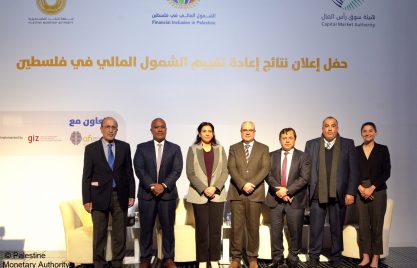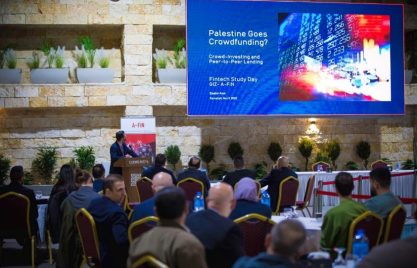Last year, we reported that a set of new regulations was published for the Palestinian microfinance sector. With the beginning of 2015, microfinance providers are fully put under the supervision of the Palestine Monetary Authority. What does that mean for the country’s economy?
Not long ago, microfinance providers were registered under different laws as NGOs, companies, or financial cooperatives, regulated by different bodies, if at all, and not supervised except for one bank offering microfinance. Their growth and professionalization perspectives were limited. The Palestine Monetary Authority (PMA), in cooperation with the GIZ MFMR programme, thus took over a supervisory role over the microfinance sector starting off in 2012 by requiring MFIs to apply for a license and comply with a set of criteria to engage in microcredit. With the beginning of 2015, the PMA effectively supervises these specialized lending institutions based on the new regulations and rules, creating an environment for the microfinance sector to flourish and reach out to the unbanked population.
Improving the microfinance sector’s soundness and attractiveness
The Palestinian MFIs have to be registered as for-profit or non-profit companies and will need to meet requirements that concern capital, governance, consumer protection, reporting, auditing, and monitoring. The advanced oversight framework of the PMA increasingly ensures financially and operationally sound MFIs with clear visions implemented by experienced and proper cadres. Now, the more extensive and regular disclosure of financials and non-financials combined with good governance contributes to building confidence among MFIs and investors and thus to the availability of funding. The Arab Center for Agriculture Development (ACAD) is a positive example that we pointed out in one of our earlier posts, and it will surely not take much time until more of the country’s MFIs will see the supervisory framework’s positive impact on their funding opportunities.
Expanding the country’s financial access frontier… responsibly
With the country’s new supervisory approach to microfinance, the sector is undergoing a period of transformation. However, additional sustainable funding sources will improve the long-term growth and professionalization perspectives of the Palestinian MFIs. Ryada, for instance, with the support of its majority shareholder just recently undertook a brand transformation into VITAS Palestine to reflect its growth and changed legal status. Indeed, an increasing competition will push MFIs to invest in their staff and systems for the sake of efficiency and in new segments of the potential market in Palestine. They will have to develop new products – with savings products as one option once allowed by PMA rules – and come up with innovative delivery channels to gain further grounds in the MSME market and in remote areas alongside meeting the new consumer protection standards. In other words, Palestinian MFIs will carry on PMA’s second-round impact on responsible financial inclusion.
By supervising microfinance, and thereby impacting MFIs’ funding and growth perspectives, the Palestine Monetary Authority provides an essential framework for a more inclusive financial sector. Supported by the MFMR programme, it will continue to promote financial inclusion, which, in the long term, aims to increase income-levels and reduce poverty.
By Atilla Yuecel



